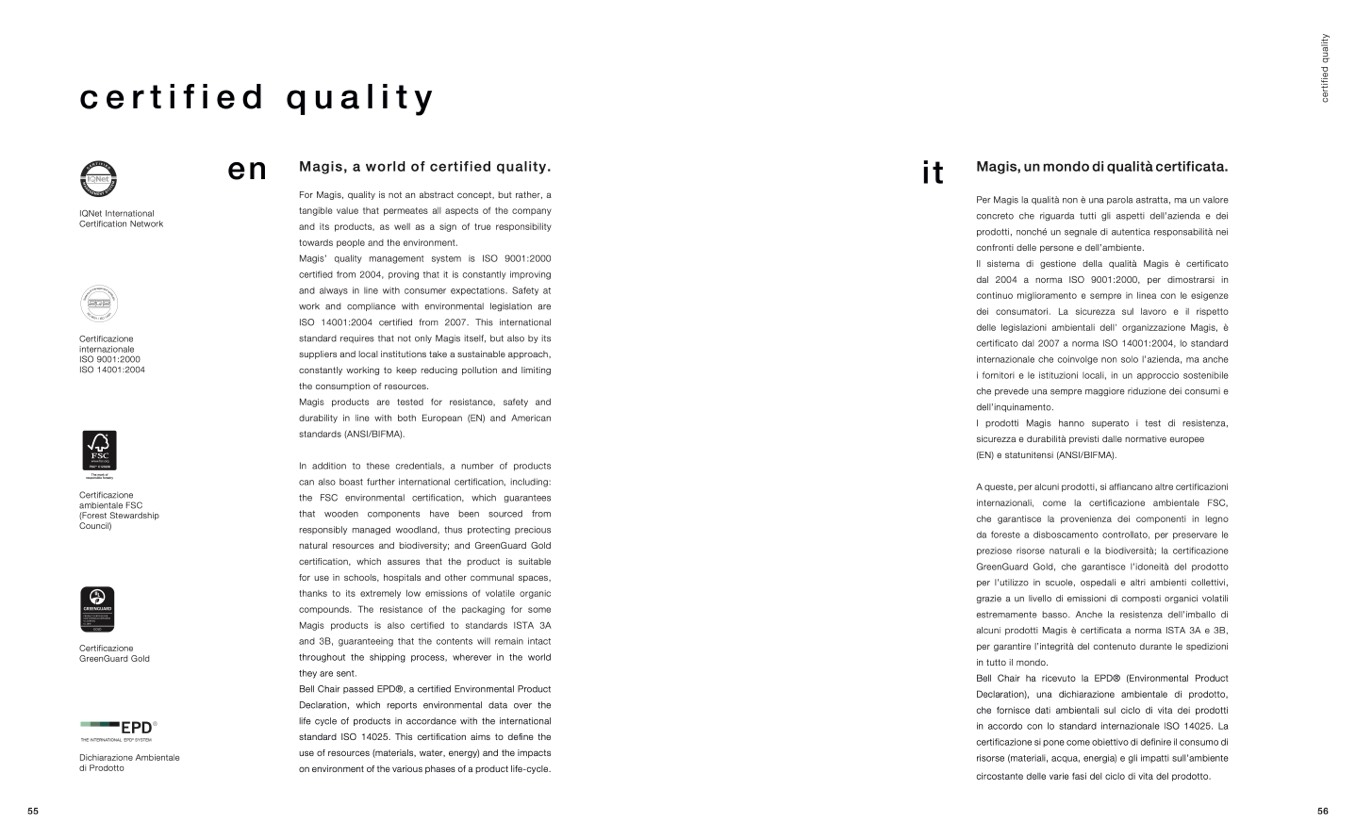
c
e
r
t
i
f
i
e
d
q
u
a
l
i
t
y
55
56
certified quality
en
it
IQNet International
Certification Network
Certificazione
internazionale
ISO 9001:2000
ISO 14001:2004
Certificazione
ambientale FSC
(Forest Stewardship
Council)
Certificazione
GreenGuard Gold
Dichiarazione Ambientale
di Prodotto
Magis, a world of certified quality.
For Magis, quality is not an abstract concept, but rather, a
tangible value that permeates all aspects of the company
and its products, as well as a sign of true responsibility
towards people and the environment.
Magis’ quality management system is ISO 9001:2000
certified from 2004, proving that it is constantly improving
and always in line with consumer expectations. Safety at
work and compliance with environmental legislation are
ISO 14001:2004 certified from 2007. This international
standard requires that not only Magis itself, but also by its
suppliers and local institutions take a sustainable approach,
constantly working to keep reducing pollution and limiting
the consumption of resources.
Magis products are tested for resistance, safety and
durability in line with both European (EN) and American
standards (ANSI/BIFMA).
In addition to these credentials, a number of products
can also boast further international certification, including:
the FSC environmental certification, which guarantees
that wooden components have been sourced from
responsibly managed woodland, thus protecting precious
natural resources and biodiversity; and GreenGuard Gold
certification, which assures that the product is suitable
for use in schools, hospitals and other communal spaces,
thanks to its extremely low emissions of volatile organic
compounds. The resistance of the packaging for some
Magis products is also certified to standards ISTA 3A
and 3B, guaranteeing that the contents will remain intact
throughout the shipping process, wherever in the world
they are sent.
Bell Chair passed EPD®, a certified Environmental Product
Declaration, which reports environmental data over the
life cycle of products in accordance with the international
standard ISO 14025. This certification aims to define the
use of resources (materials, water, energy) and the impacts
on environment of the various phases of a product life-cycle.
Magis, un mondo di qualità certificata.
Per Magis la qualità non è una parola astratta, ma un valore
concreto che riguarda tutti gli aspetti dell’azienda e dei
prodotti, nonché un segnale di autentica responsabilità nei
confronti delle persone e dell’ambiente.
Il sistema di gestione della qualità Magis è certificato
dal 2004 a norma ISO 9001:2000, per dimostrarsi in
continuo miglioramento e sempre in linea con le esigenze
dei consumatori. La sicurezza sul lavoro e il rispetto
delle legislazioni ambientali dell’ organizzazione Magis, è
certificato dal 2007 a norma ISO 14001:2004, lo standard
internazionale che coinvolge non solo l’azienda, ma anche
i fornitori e le istituzioni locali, in un approccio sostenibile
che prevede una sempre maggiore riduzione dei consumi e
dell’inquinamento.
I prodotti Magis hanno superato i test di resistenza,
sicurezza e durabilità previsti dalle normative europee
(EN) e statunitensi (ANSI/BIFMA).
A queste, per alcuni prodotti, si affiancano altre certificazioni
internazionali, come la certificazione ambientale FSC,
che garantisce la provenienza dei componenti in legno
da foreste a disboscamento controllato, per preservare le
preziose risorse naturali e la biodiversità; la certificazione
GreenGuard Gold, che garantisce l’idoneità del prodotto
per l’utilizzo in scuole, ospedali e altri ambienti collettivi,
grazie a un livello di emissioni di composti organici volatili
estremamente basso. Anche la resistenza dell’imballo di
alcuni prodotti Magis è certificata a norma ISTA 3A e 3B,
per garantire l’integrità del contenuto durante le spedizioni
in tutto il mondo.
Bell Chair ha ricevuto la EPD® (Environmental Product
Declaration), una dichiarazione ambientale di prodotto,
che fornisce dati ambientali sul ciclo di vita dei prodotti
in accordo con lo standard internazionale ISO 14025. La
certificazione si pone come obiettivo di definire il consumo di
risorse (materiali, acqua, energia) e gli impatti sull’ambiente
circostante delle varie fasi del ciclo di vita del prodotto.

